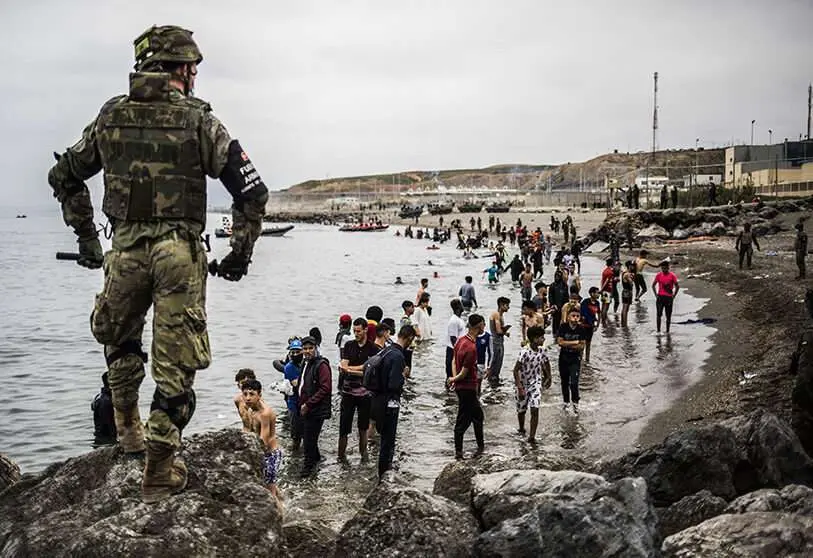Chronicle of an invasion foretold

At first it was just a small horde of children and then the ranks grew, in groups of 20 and then 30. There have been thousands of Moroccan migrants arriving in Spain in a single day. 6,000, according to the Spanish authorities on the night of 17 May. Most of them arrive from Fnideq.
The pearl of the Moroccan north, whose charms are constantly praised by tour operators, has become a veritable hell for its inhabitants, who have only one thought in mind: to leave. It is heartbreaking to hear the testimonies of those who are leaving or those who want to leave, the youngest being 8 years old.
Today Fnideq is suffocating like other towns in northern Morocco, which used to live mainly from the smuggling trade with the Spanish enclaves of Ceuta and Melilla.
All trade at the Bab Sebta post stopped in 2019 and the Melilla border post has been closed since 2018. Thousands of families have found themselves, de facto, without resources and misery has only increased, aggravated by the international health crisis.
For several months now, demonstrations and clashes have shaken the region to denounce the precariousness and unemployment that have become endemic to the region.
And less than 3 kilometres away is Ceuta, and the dream of a better life is emerging for many people. In a spontaneous action that was later organised, desperate young people attempted the adventure. If, unfortunately, we have become accustomed to seeing young people leaving their country aboard boats of misfortune, today it is women with their children who have literally thrown themselves into the water. The images of the babies rescued by the Spanish Guardia Civil have shocked Moroccan public opinion and show the magnitude of the crisis.
No one had imagined such desperation. Entire families, by the thousands, are leaving Fnideq in a spectacular exodus.
The Moroccan authorities have not prevented this migratory flow towards Spain, and the link with the political crisis between the two countries has been quickly established.
For several weeks now, Morocco has been fulminating after the hospitalisation in Spain of Polisario leader Brahim Ghali, who is actively sought by Rabat and accused of multiple crimes. Spain has invoked the principles of humanism in this case, which is far from convincing Morocco.
In this dispute between neighbours, the root of the problem is almost forgotten: the great misery that reigns in the northern regions. The people on both sides of the border see themselves as the forgotten ones of their respective governments.
The head of the Spanish government, Pedro Sánchez, who came to the scene, was greeted with insults. Ceuta is also suffocating after the closure of the border with Morocco. Economic crisis, insecurity, the small enclave of less than 85,000 souls suffers from multiple ills. The city's peripheral neighbourhoods have become veritable ghettos, such as the notorious El Príncipe, known for its gang wars, but also for the jihadists who have joined the ranks of Daesh in Syria and Iraq.
The Spanish police are also finding it very difficult to bring order to these neighbourhoods where illegal trade of all kinds is rampant.
Europe quickly came to Spain's rescue. Brussels does not want the political crisis between the two neighbouring countries to turn into a migration crisis. If Morocco has the possibility to open the migration floodgates, the EU warns: "Ceuta is Europe, this border is a European border and what is happening there is not a Madrid problem, it is a problem for all Europeans", said Mr Schinas, vice-president of the European Commission.
By the day after their arrival, Spain had already expelled almost half of the migrants. But more than a thousand minors are still on Spanish soil and cannot be expelled under Spanish law.
After this impressive crossing, another massive departure was organised on the Melilla side. The Moroccan authorities claim to have blocked almost 3,000 people, but 86 migrants managed to cross the border. On Tuesday night, another event exacerbated tensions. Two Moroccans with gunshot wounds were taken to hospital in Tetouan and claim to have been shot with live ammunition by Spanish police...
Despite the collateral damage, the political crisis between Morocco and Spain will eventually subside, given the common interests between the two countries, but the economic and migration crisis is likely to take a new turn.

